There are two reasons that I am going to explicitly state as to why you should definitely watch Ari Aster’s Swedish summer cult folk horror film. Firstly, if you think that the night is the venue for horrors, and that all effective horror essentially mines itself from the dark. Seriously, watch Midsommar and you will realise that the day can be just as scary, it’s just a matter of surrounding yourself with the right (!) people. Second, if you think that you had an ugly breakup, or you caught your partner being an infidel and want to see them pay for it. Seriously, watch Midsommar and you will thank your lord that things didn’t get ‘that’ ugly.
Director Ari Aster lands with his second feature film within a year, and while it somewhat repeats the merits and demerits of his previous work, ‘Hereditary’, I would state that ‘Midsommar’ is just as terrifying as well. Our predicament is that we have been fed jump scares with loud sounds far too often now to know what the basic definition of horror is. ‘Midsommar’ doesn’t solve that, and you shouldn’t expect it to either. But, does it make you feel horrified over what transpires over its 150 minute runtime? Unequivocally yes, even if once for the most steely nerved viewers.
However, that’s not to say that all’s too well in paradise. I am still framing a concise opinion as I go through its delirious ending, which is, safe to say, something that I would remember for some time. The film, more so. For now, a quick skimming over its ending and what it meant for Dani, our troubled protagonist, is in order, I believe?
The Ending, Explained
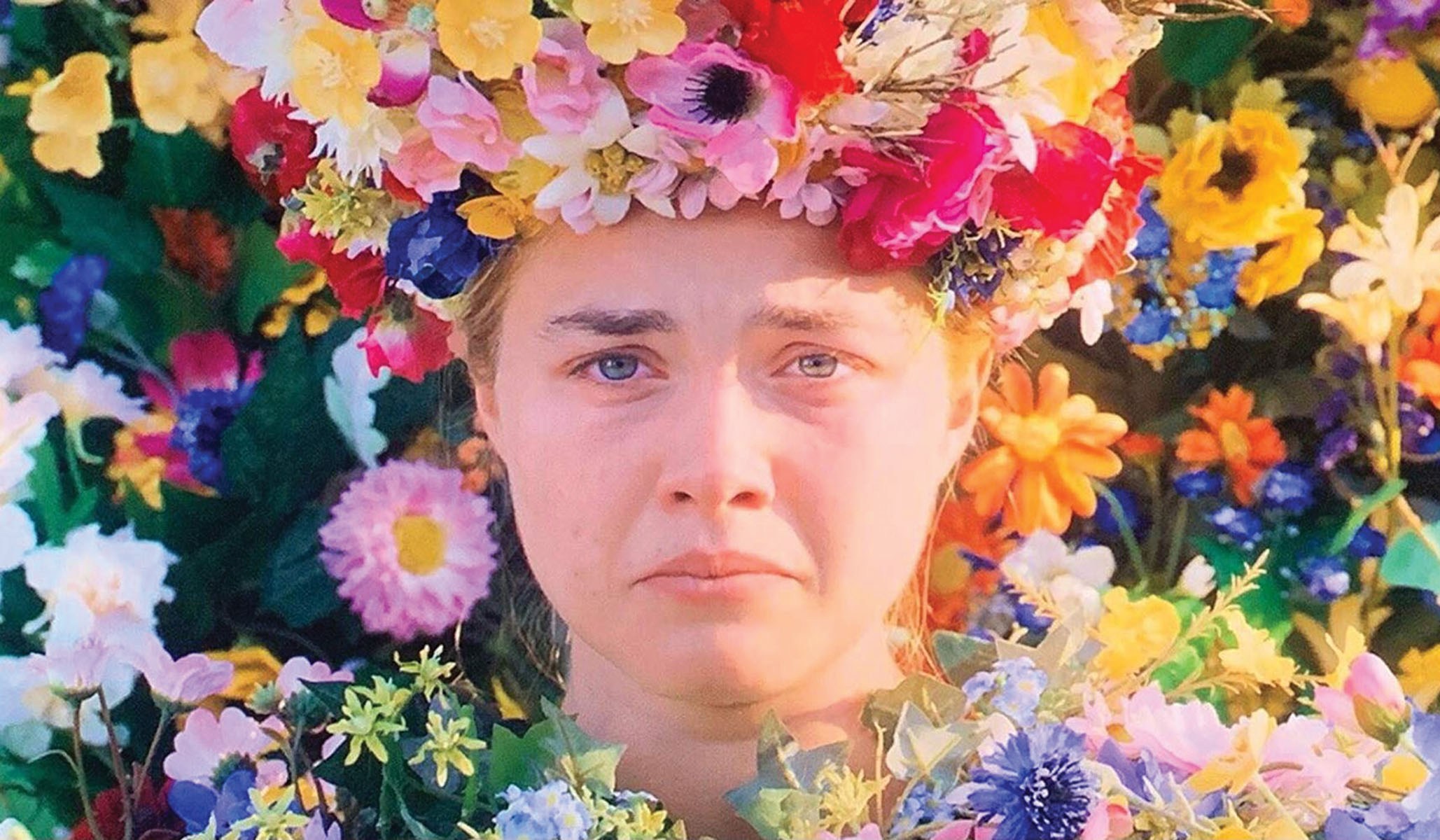
A noteworthy thing here, personally so, would be that I didn’t feel ‘Midsommar’ to have a sense of finality to its chaotic and brutal final act. Sure, the three part narrative structure is there, but I had a little trouble clearly defining the distinction between the middle and the final acts. But again, that is not to say in any way that it’s anticlimactic. Perhaps I was drawn into the Hargan commune or the beautiful Swedish plains too much. So, for beginning with the explaining, we begin with the morning whence the elders report that their ancient runic book to be missing, and both Josh and Mark are nowhere to be found. Both Christian and Dani regretfully state to the elders denying any knowledge of the events that may have led to the disappearance of the book, before Dani proceeds with the day’s activities and Christian is summoned by Siv, an elder woman at the commune.
The May Queen
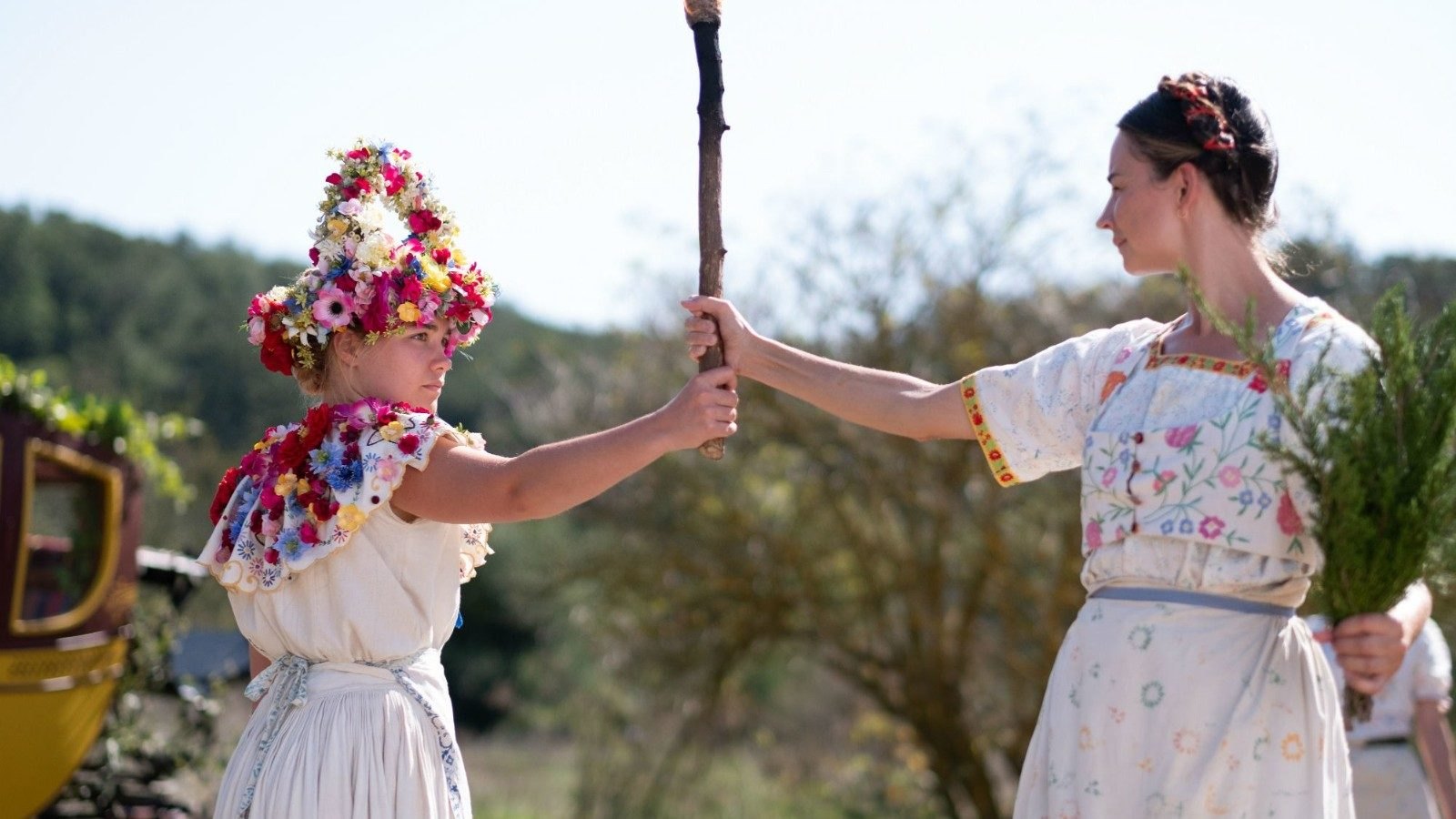
By this point in the film, Dani is already overcome with Christian’s indifference towards her, and is a little more than sceptical about his behaviour. She proceeds for the day’s activities, a maypole dancing competition for the young females of the commune, with the winner being crowned ‘May Queen’, after consuming a specially prepared drink that she later realises is spiked with hallucinogens, well, as is every other drink at the cult commune.
The women begin dancing around the maypole in concentric circles around the maypole, with the dance and the competition getting increasingly complex as they moved. This is perhaps the first time during the entirety of the commune’s duration that Dani actually feels a sense of belonging, as is evident from her sense of disbelief when she lands among the final eight, or just even as she dances and let go. She eventually is able to win the competition, even if by a slight hand of chance, and is crowned the May Queen, even as her condition deteriorates from nausea from spinning, the consumption of the hallucinogenic drink and the exhaustion from dancing. She is immediately beloved and revered by the members of the commune, and after blessing their crops and livestock, presides over a luncheon where she sees Christian behaving unusually.
The Mating Ritual
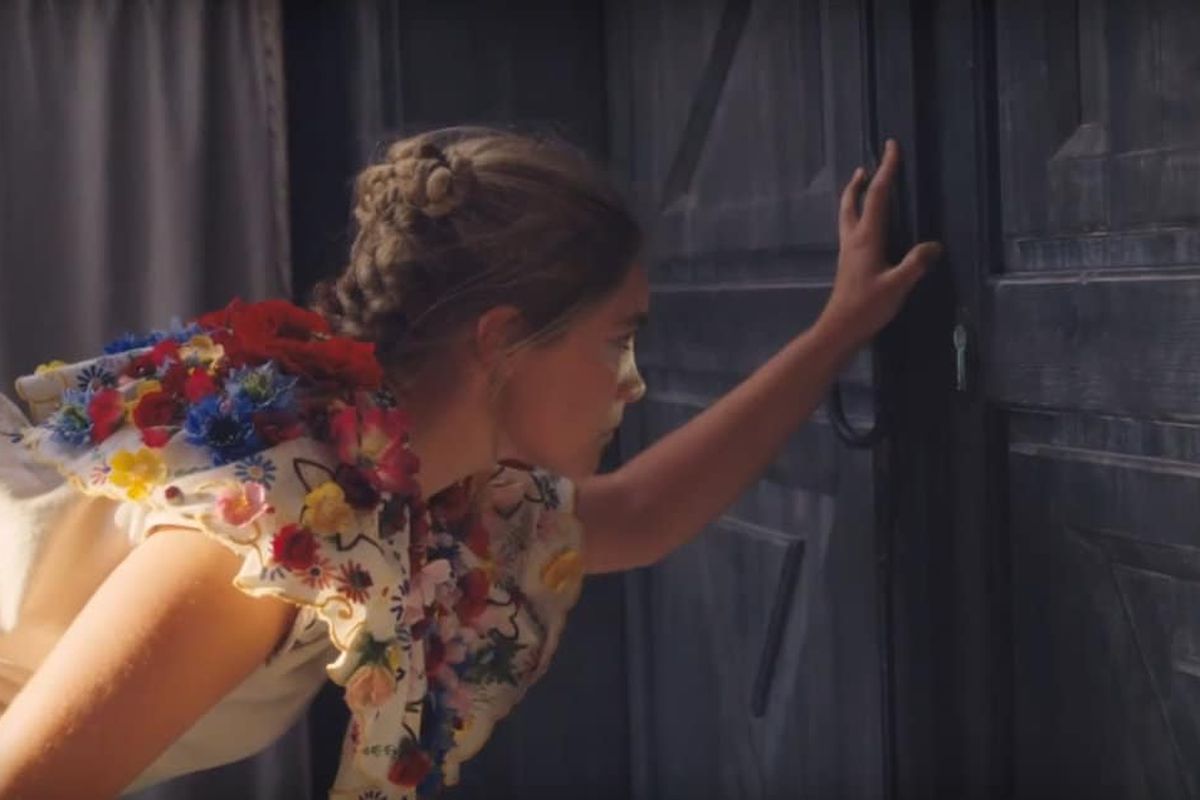
In his meeting with Siv, Christian is informed that he has been chosen to mate with Maja, one of the cultists, as an attempt by the commune to bring in foreign blood into their own pool, citing that their astrology matched. The same ritual had also been foreshadowed earlier in the film, when Simon and Connie observe a piece of tapestry that depicted a woman falling in love with a man and luring him by using love spells, cast through runes, and weirdly enough, putting pubic hair in the man’s food, all of which Maja does for Christian.
While Christian witnesses the maypole dancing competition, he is served the hallucinogenic tea, and immediately begins feeling a pull towards Maja. He is dressed and prepped for a mating ritual with her while under influence, and guided to the place where the two consummate, while the women of the cult guide and encourage the process, mimicking the same pleasure noises that Maja makes. Their chanting in unison attracts the attention of Dani who is shell shocked to see Christian cheating on her, even if under influence which she is unaware about. She wails in anxiety, uncontrollably, even as she is followed and consoled by the Harga women, who wail in unison with her.
With the ritual now complete, Christian’s spell/influence now wears off, and he wanders off naked, outside, to uncover the commune’s and the cult’s horrific truths. He sees Josh’s leg propped up inside the ground, and Simon’s body, ritually dismembered and strung up like a blood eagle. Two of the elders walk in, and paralyse Christian by making him inhale a powder, and he is prepped again for the next part of the ritual. To add something here, in a way, this was also the commune’s way of deliberately working towards splitting them up, furthering the hypothesis that they never intended Dani to be the May Queen, but one of the subjects for sacrifice, which brings us directly to our next section.
The Sacrifice
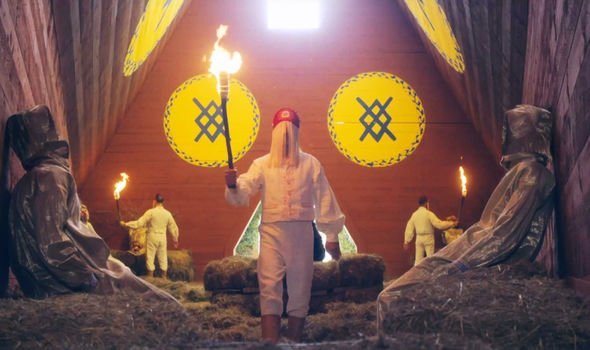
With Christian paralysed and placed in a chair to bear witness to the final part of their ordeals, and Dani as the May Queen, the Hargans begin the last of their rituals to close their once in ninety years festival. An elder tells Dani that as per tradition, nine human lives must be sacrificed ritualistically ridding the Hargans of all that they thought was evil, all that they wanted to purge. Out of those nine, four lives have to be of the Hargans themselves, four of outsiders, and the ninth and final one must be chosen by the May Queen between a native Hargan and an outsider.
At this moment, it is revealed that all of the guests that arrived at the Hargan commune had been killed in horrific ways, and that they were offered up by Pelle and lured into the commune only to be later offered up as sacrifices, just as his brother Ingemar brought in Simon and Connie from London. Josh’s leg has been cut off, Simon had been made into a blood eagle, Connie is brought in her bare remains as well, whereas Mark, who presumably had the worst fate of all, although by now it is tough to ascertain which one of the ways is more horrific, has only his scalp and face mask remaining, dressed as a jester with a clown hat over a straw dummy and placed in the ritualistic pyre set up within the yellow pyramidal temple that Dani was earlier forbidden into.
The other outsider sacrifices: Josh, Simon and Connie too are brought in dressed as weird pieces of art, with branches stuffed in places of limbs and the like. Among the four Hargan human sacrifices from the commune, two include the senicides committed by the elders from earlier in the film, and two of them volunteer, including Pelle’s brother Ingemar, and Ulf, another villager. Dani chooses Christian as the ninth one among him and another villager, and Christian is dressed inside a disembowelled bear and placed in the pyre along with the others, which is then set on fire.
While Christian is still paralysed and burns in the pyre along with the others who were already dead, as the temple around them collapses, Ulf who is alive begins wailing and crying in pain. Hearing this, the members of the commune too start wailing to the tunes of him and in unison around Dani now dressed in her floral throne. She looks on in horror, still in a partially inebriated state, while eventually she begins to smile as the film closes.
Unpoetic Justice
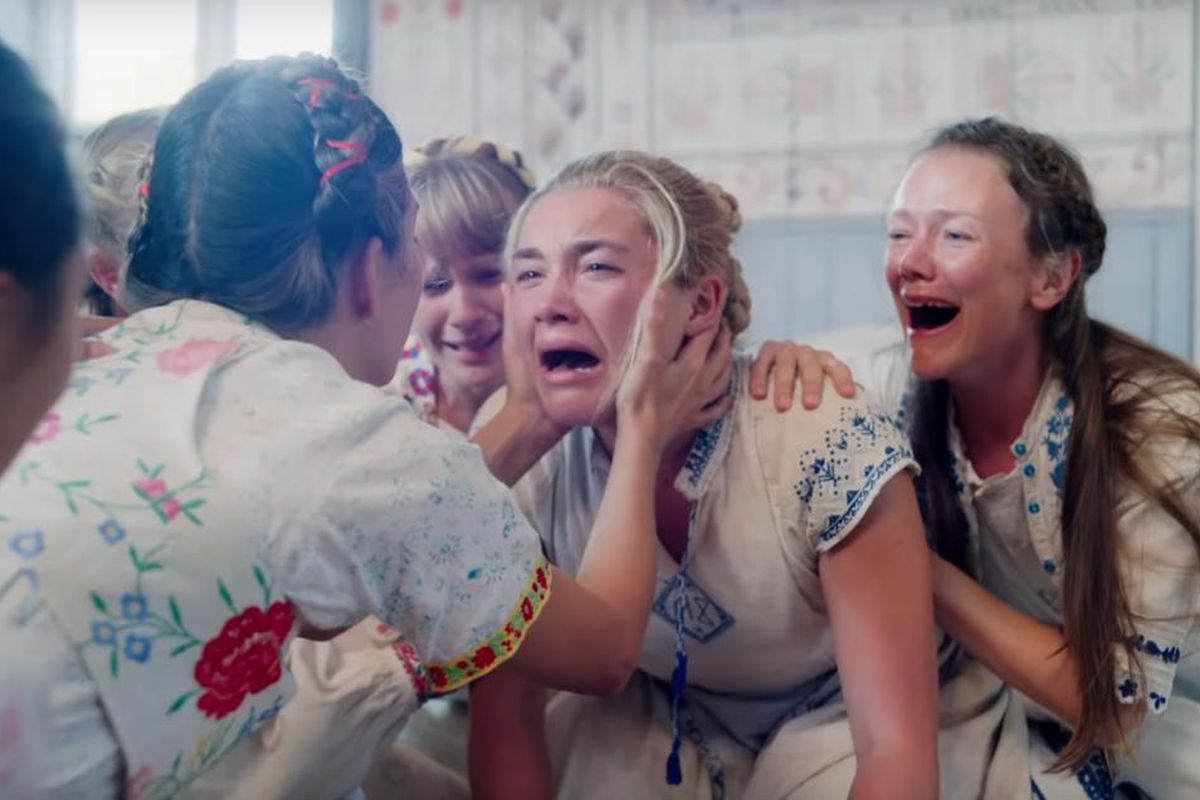
The biggest question looming right now is perhaps this: Why did Dani choose to sacrifice Christian? And what of Dani after that? For understanding this, which I think is the thematic core of the film itself, one has to take into account Dani’s journey from the beginning of the film. Immediately near the beginning of the film, she loses her parents and sister in a horrific and disturbing suicide cum murder, committed by her bipolar sister herself, and she only has Christian to bank upon during this hard time.
Christian on the other hand had already been planning to find a way out of the relationship, but stays and is only marginally available for Dani while she is traumatised and needs someone to get her through the tough times. He doesn’t invite her to Sweden for the commune, forgets her birthday and isn’t aware of the duration of their relationship, which is considerable.
Of course, these things or activities may mean different things for different people depending on their relationships, but the person in question here is Dani, who is clearly upset at Christian’s indifference to these things, yet still hanging on to him, because she wants to be with someone, now more than ever. She agrees to go to the commune thinking it would be a good break for her, but it turns out to be her catharsis, however unfortunate it may be for all the other people who visited.
While Christian’s indifference towards her continues, for the first time at the commune, she feels a sense of belonging, a sense of being cared for. The ladies at the commune take her cooking, and to assist in their daily activities. She also seems to savour, even if she was only half in her senses at that moment, the way the people of the commune almost worship her and revere her when she becomes the May Queen. However, her true catharsis comes when she peeps through the door into the place where the mating ritual is taking place. Once she presumes that Christian was an infidel after she sees him fornicating with Maja, not knowing he was under influence, she suffers what appears to be an onslaught of anxiety and grief, but she is immediately held and supported by the women of the commune, who comfort her and wail loudly in unison with her in order to share her grief.
This scene stands apart in stark contrast with the scene when she suffers a similar breakdown on the flight to Sweden, and cries in the lavatory alone. The Hargans too, display this trait of togetherness all through the film. Even if it’s tradition, they scream in unison with the old man who failed to die after jumping off the cliff during the attestupa, mimicked the moaning of Maja while she was consummating her love (or need) with Christian, and even when Ulf burned in the sacrificial pyre, they first revel in his cry as a sign of togetherness, only later celebrating on the completion of the ritual. They may not be all too welcoming to outsiders, but inside the commune, they are one large family, however horrible or murderous. To cut a long story short, in every twisted way that you can imagine, Dani found a family among the Hargan cultists. It is, as Pelle confronted Dani about her relationship with Christian, asking her if she felt “held”.
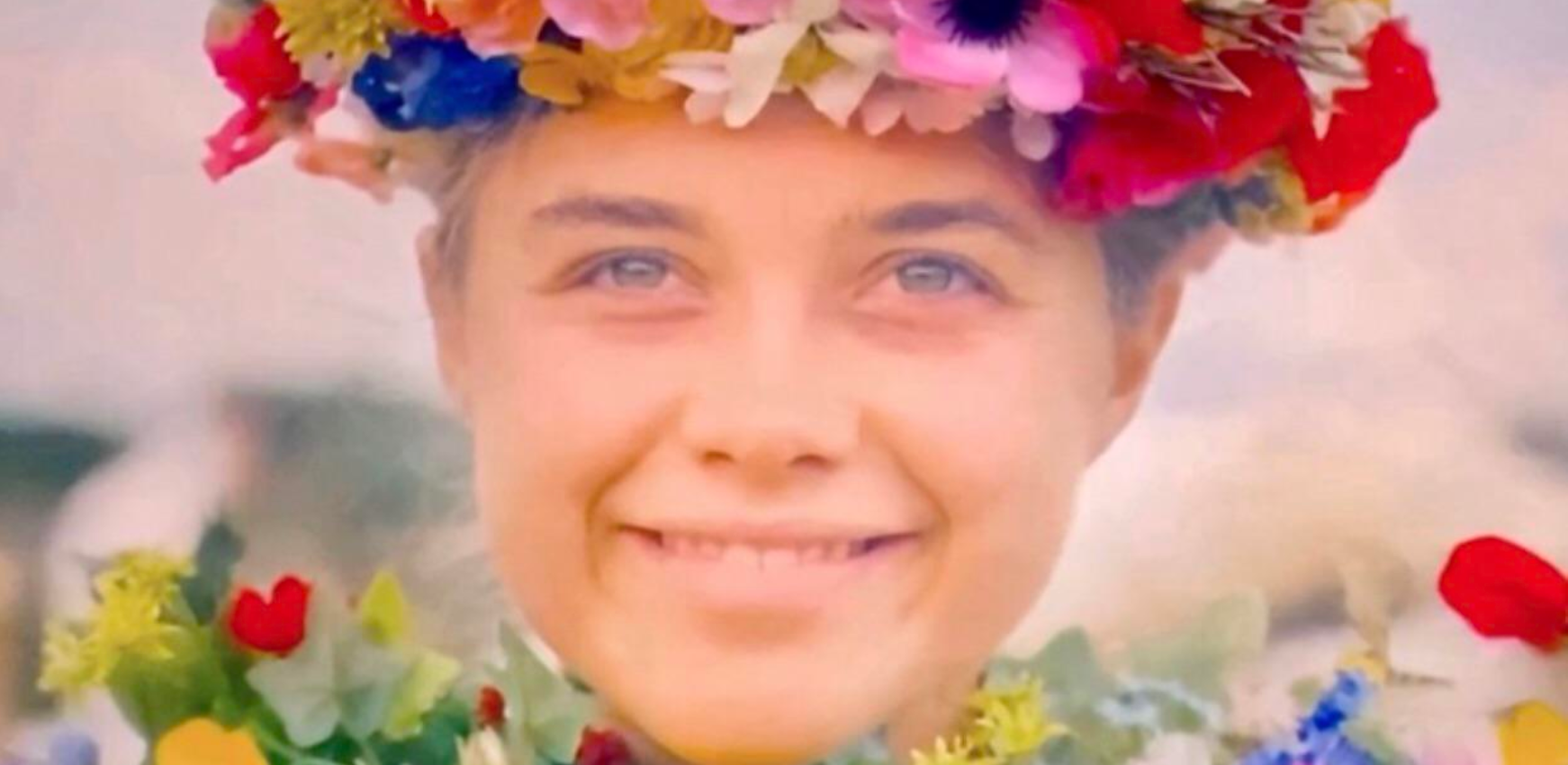
Yet still, it is important to establish that Dani isn’t some crazed killer or a dumped girlfriend out for revenge. She is clearly not completely in her sense when she orders Christian’s execution, so to say. She is worn out from the maypole dancing and nauseated, and still hallucinating from the drink she was given. All that she knew at that moment was that Christian had wronged him, which is what made her smile perhaps, seeing him suffering even if from a distance. Perhaps she would break into another episode when back in her senses, but for now, she clearly cannot think straight.
As for the foreseeable future, who can tell what would have precisely happened. Although, the most presumable stream of thought here would be that she stayed, with or without Pelle. Returning home to an empty life faced with the questions of the boys’ disappearance altogether would not exactly add up to be her way of dealing with the trauma of the events of the commune. Aster clearly stated that ‘Midsommar’ was “a breakup movie dressed in the clothes of a folk horror film.” Now you know what he entirely meant.
Final Word
![]()
Ari Aster announced his arrival in the arena of horror films with ‘Hereditary’ that had many a tropes to show you around what horrors may reside within a family. With ‘Midsommar’, he announces that he is here to stay. Quite honestly speaking, I already know a number of people who would firstly be questioning the reason or the purpose of this film, and secondly, be completely averted to the film, courtesy of its more than visual and graphic disturbing scenes.
I award merit to all those questions, but I also acknowledge that they wouldn’t stop me from appreciating what this film achieves as craft. Yes, the indulgences show at certain points, but then what good director doesn’t have indulgences? On the contrary, I thought all the time Aster spent setting up this beautiful yet horrific lush summer landscape only furthered the film clutching me completely while delivering its brutal finale. You may even be exhausted and confused by the time the credits roll, but be assured: it’s all part of what gets you there. Florence Pugh in the role of Dani Aster is one of the film’s unwavering strengths. Even if the pace falters, her emotional gamut doesn’t.
If you are tired of or have had your fill of jump scares or the kind of blockbuster horror that is characteristic of the ‘Conjuring’ universe, also provided that you can stomach a certain level of graphic imagery that is truly disturbing (proper emphasis on this), you should give ‘Midsommar’ a try. It’s weird, it’s messy, and even frustrating at some points, but it paints a world in broad daylight devoid of any supernatural entities that you’d dare visit even in your darnedest dreams. That there is a win.
Read More in Explainers: Ready or Not | The Witch

You must be logged in to post a comment.